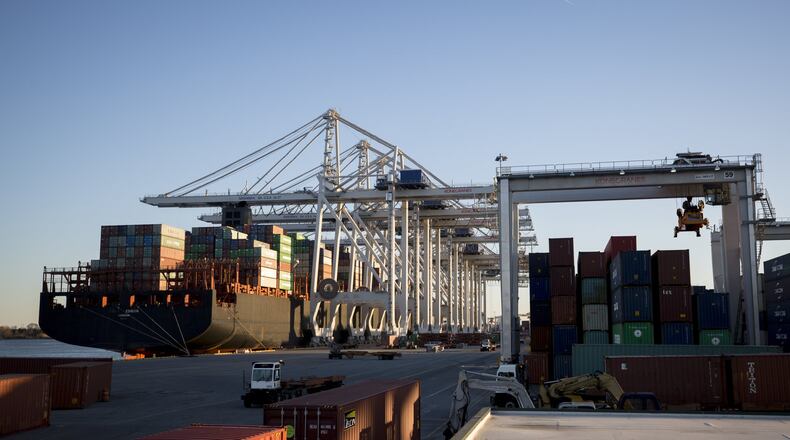Georgia's economy will likely take its first hit from the coronavirus very soon, with shipments into the state's ports dropping up to 40% in March and April, according to projections by the agency that manages that traffic.
Cuts and closures in Chinese production since the outbreak of the virus about six weeks ago has not yet been felt here, but that is about to change, according to Griffith Lynch, executive director of the Georgia Ports Authority.
“We do see quite an impact,” he said. “We’ve been shut down by hurricanes for six days or a week. But this is really unprecedented.”
Virtually all of that anticipated drop is linked to China, Georgia's largest trading partner. Last year, the state imported about $19.8 billion in goods from China, according to the Georgia Department of Economic Development.
Among the goods imported from China are seats, toys, furniture and floor coverings.
The authority has 1,360 employees, most of them at the ports in Savannah and Brunswick, but tens of thousands of others work for shipping and trucking companies.
The coming chill in business would threaten those jobs, but only if the virus-related problems continue for more than a few months, Lynch said. “Because it’s a spot issue, I think we’ll see the jobs safe, but they will work fewer hours and there will be no overtime.”
The economic impact could be widespread. About 440,000 jobs – roughly one in every nine in Georgia – is dependent on the ports and the commerce that moves through them, according to a 2017 study by the University of Georgia's Terry College of Business.
About half of those jobs are in metro Atlanta, according to economist Jeff Humphreys, author of the report and director of the Selig Center for Growth.
“The ports are especially supportive of other forms of transportation, manufacturing, wholesale/distribution centers, and agriculture,” he wrote.
There is about a 30-day lag between the time a ship leaves China and its arrival on the coast of Georgia. That is why the ports have yet to feel the impact of the virus. And when manufacturing ramps up, it will likewise take about a month for normality to return at the ports.
“It’s going to be a difficult time, but hopefully it is going to be short-lived,” Lynch said.
The long-range impact of the virus is still uncertain. While many Chinese factories have reopened, production is reportedly still less than half its normal levels since many plants do not have their full staff.
Moreover, production in other Asian countries – especially South Korea, Japan and Vietnam, — depends on parts that come from China. And those countries too are now dealing with the spread of the disease itself.
About the Author
Keep Reading
The Latest
Featured



